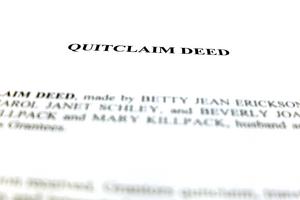Home & Leisure
/ArcaMax

Resident booted from HOA board due to language of living trust
Q: I placed my condo in a living trust for estate purposes. I am the beneficiary of the trust and I can amend, add and remove administrators. However, I am not the trustee of my trust.
I was a board member of our homeowners association (HOA). The manager of our HOA said I was required to resign from the board, I could not serve on committees, ...Read more

We weighed in on a reader’s positive experience selling by owner
Reader comment: I recently read your column in the Chicago Tribune, and I’d like to share my experience of selling my home on my own.
I had an appraiser come to my home. He was hired by the buyer’s mortgage company. I’m 65, and have lived in my home my whole life. The appraiser was older and very familiar with my neighborhood. He even ...Read more

Homebuyers seek advice regarding parents acting as their lender
Q: My mother- and father-in-law want to act as the mortgage lender for me and my wife when we purchase a new house. We would like to help them figure out the steps they need to go through in order to document, register, and pay off the mortgage correctly, but we are having trouble getting a clear answer on how to do this. Could you advise us on ...Read more

What are the tax implications of gifting a home?
Q: A friend is buying his parents’ home. He is using an online lender. He doesn’t have a real estate agent, and there is no written sales contract. The lender says his parents can gift him the house and the lender will then set up a refinance loan for him. Would the transfer of the home to my friend cause his parents to pay some type of tax ...Read more

Homeowner seeks release paper, but title company is no longer in business
Q: I need a release paper from the title company. The unfortunate thing is that they are no longer in business. I am unable to find them or anybody that can help me. I am helping my dad and he is 87 years old.
A: We hear from readers dealing with this frustrating situation more often than you’d think. But if you’re looking for the release ...Read more

How to decline inherited property from abroad
Q: My uncle passed away and left a will. I am the executor for the estate. However, there is a second person named in the will who lives out of the country. The will states that all of the property is to be equally divided between that person and me. What documentation needs to be drafted or filed if that person wants to give me their share? Can...Read more

If you have a buyer for your home, do you need a real estate agent?
Q: We will be selling our home in the near future, and a neighbor a few doors down has expressed an interest in buying our home. She would be downsizing from a larger multistory home to our smaller ranch home.
If we each have our own real estate attorneys representing us, is it necessary to involve a real estate agent? Of course, an essential ...Read more

Resident believes board president is making questionable governance choices
Q: I live in a 300-plus unit condo complex. There are two things going on in our condo that seem like inappropriate board overreach.
First, the new president has required that the Pledge of Allegiance be recited before meetings. But American citizenship is not required to own property in Illinois. Plus, reciting the pledge has nothing to do ...Read more

Are home equity investment companies safe?
Q: I live in California and read your article earlier this year about a new way for homeowners to tap their equity without selling. I am living off of an annuity, but when that runs out, I want to be able to tap the equity in my home and I’m not sure what is the best way to do that.
My choices are to use a reverse mortgage, sell my home, get ...Read more

How to determine if teardown interest exceeds resale value
Q: We have a very nice mid-’50s home in a great neighborhood. We are only the second owners of the home. It’s well maintained, but its “2025” shortcomings are it has one bathroom, one garage space and two bedrooms. We are near town and the train line. Comparable condos in town are selling for much more than I think we could expect.
Our ...Read more

Shutdown surprises in store for homebuyers and sellers
Once again, the real estate market finds itself in uncertain times.
The federal government shutdown is creating uncertainty in residential real estate markets. While some economists predict mortgage rates could drop slightly as investors move toward safer bonds, housing experts warn that economic volatility and processing delays may offset any ...Read more

Tax implications differ when property is transferred via quitclaim deed
Q: My parents live on two acres of land in Wisconsin, and they own the two acres of land next to them. My parents, my husband and I have agreed that we (my husband and I) will build a house on that extra two acres of land.
An estate attorney sent us to a real estate attorney who recommended that we do a quitclaim deed. The first option was to ...Read more

Adding children to the title of your home usually has tax consequences
Q: My daughter’s name was added to the title to her mother’s home so that she could inherit the house tax free. Her mom has now died and my daughter is selling the home. What are the tax consequences?
A: This is our least favorite way for parents to pass on ownership. When you add a child’s name to the title, you’re essentially gifting ...Read more



























